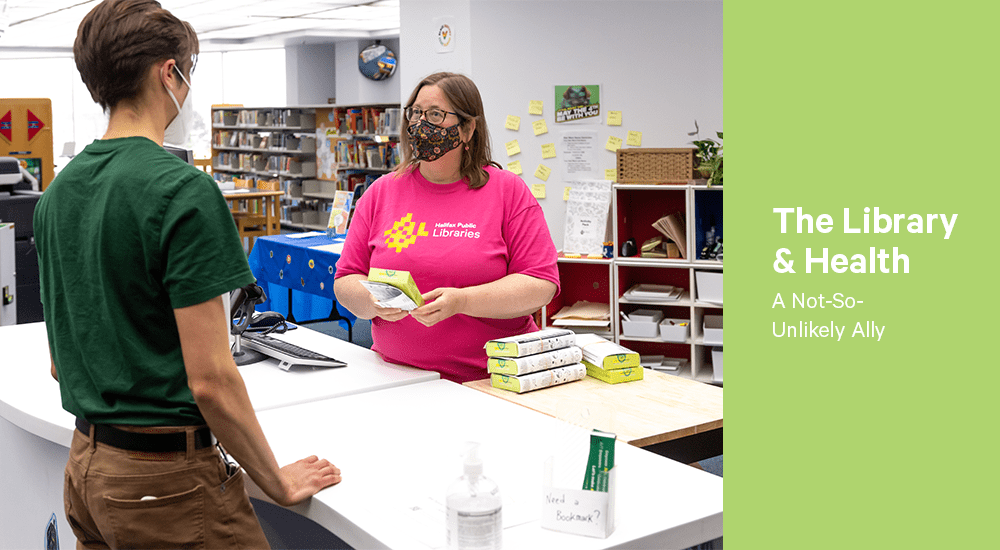A resounding “yes”
When Nova Scotia’s public libraries got a call on a Tuesday evening in Summer 2020 from the Government, asking “Can we deliver hundreds of thousands of masks to you at the end of the week for distribution?” The answer was “yes,” and the response echoed onward.
Can libraries serve as pop-up COVID-19 testing sites? “Yes.”
Vaccination sites? “Yes.”
In November 2021, when libraries were approached to help support the distribution of COVID-19 Rapid Testing Kits, the answer was naturally, once again, “Yes.”
“Of course we can, because we're used to moving things across an entire municipality every day,” says Chief Librarian and CEO, Åsa Kachan. “So, we have that distribution infrastructure. We have that network of trusted local spaces. It was just natural that we would leverage those for the public good in a different way than we ever would have imagined.”

Watch the video story:
Another kind of literacy
Literacy is foundational to good health. Reading, access to the internet, access to information, and the ability to process and sift through that information, were highlighted even more as building blocks for health when COVID-19 arrived.
“When you think about the global pandemic that we have been through together over the past few years, where do you find out where the case numbers are?,” asks Åsa.
“How do you find out where immunization locations are? How do you book an appointment? Library staff helped in support of that. They were there, providing that critical knowledge to people at that critical time in the process.”
Through each turn of the pandemic, each updated policy and health measure, libraries worked alongside public health to use their anchor-points in communities for education, immunization, and distribution.
For the public good

“We, the Library, doesn't belong to the librarians, and the staff who work here. The Library belongs to the people. So, we need to be what the public needs us to be at this time in history, in this moment, in this community. And that requires a lot of flexibility on our part.”
The flexibility and compassion of Library staff on the frontlines and behind the scenes was fundamental to the success of every new public health effort.
Library Administration staff member, Tracey Stone, who leads the coordination of Rapid Test Kit distribution and stocking among branches, reflects: “One of the neat things is that the situation just continued to evolve as we went along. It’s been a true team effort with staff helping to improve the process throughout.”
Tracey recalls that as the Library got the Rapid Test Kits pick-up program underway in branches in the late fall, “our Borrow by Mail and Home Delivery teams both reached out and said, ‘Hey, we can help get these Rapid Tests into the hands of community members. If you want to supply us, we'll make that happen.’” So, the team adjusted and continues to send out even more kits to rurally-located and isolated community members.
From branch staff answering phone inquiries, to team members packing boxes and printing and folding information sheets, everyone has played a role.
“And none of this can happen without our Delivery team,” Tracey says. “They have dropped everything to move boxes. When you look at the size of this [testing kit] box, we've moved almost 2,000 of these boxes alone. They’ve come through every time.”
Going strong
Between April 1, 2021 and March 31, 2022, 185,168 Rapid Test Kits (with 4 tests per kit) were distributed to community members by way of Halifax Public Libraries.
Public Health has reported back to the Library, that community trust in the organization and its staff has played an important role in seeing more people rely on and access masks, more people come out for vaccinations, and more people test for COVID-19, more often.
“That trust in us, that knowledge that they are welcome to cross the threshold; that they belong here. That encouraged better health behaviour on the part of our community. That made me really proud. It felt like more people understood the value that we brought, and look to us as that natural, trusted local partner in the delivery of services to the public,” says Åsa.
Here for you

![]() “We don't want to become a nostalgic institution,” she says. “We don't want to be a place that people remember going to when they were young. We actually want to be constantly changing and remaining relevant. So that means changing formats. That means beginning to distribute things that, you know, when I went to Library School eons ago, we would never have talked about bike lending, or radon detectors, or musical instruments, or being at an immunization or a testing site.” And, here we are.
“We don't want to become a nostalgic institution,” she says. “We don't want to be a place that people remember going to when they were young. We actually want to be constantly changing and remaining relevant. So that means changing formats. That means beginning to distribute things that, you know, when I went to Library School eons ago, we would never have talked about bike lending, or radon detectors, or musical instruments, or being at an immunization or a testing site.” And, here we are.
“Those are all things that are resonating with our community. As an organization that's been around for a long time, being able to adjust and change and being open to that change, and rolling up our sleeves and getting it done—that's vital for our community, but it's also really important for us as libraries to remain relevant.”
As Tracey sorts through the next round of Rapid Test Kit and Pulse Oximeter boxes for the Library’s Delivery Team to distribute, from Sheet Harbour to Hubbards, she says:
“During my time at the Library, I have watched things evolve over the last number of years. And more and more, libraries are the go-to place for just about anything and everything. So it's gone from being, you know, a disseminator of information, to: ‘If you need something, then probably, the place to go is the Library.”
This story was originally published as part of the Library's 2021-22 Annual Report to our community. Read and explore the full report here.
Learn more about the current status of Rapid Test Kits at the Library.



Add a comment to: The Library’s Role in Health